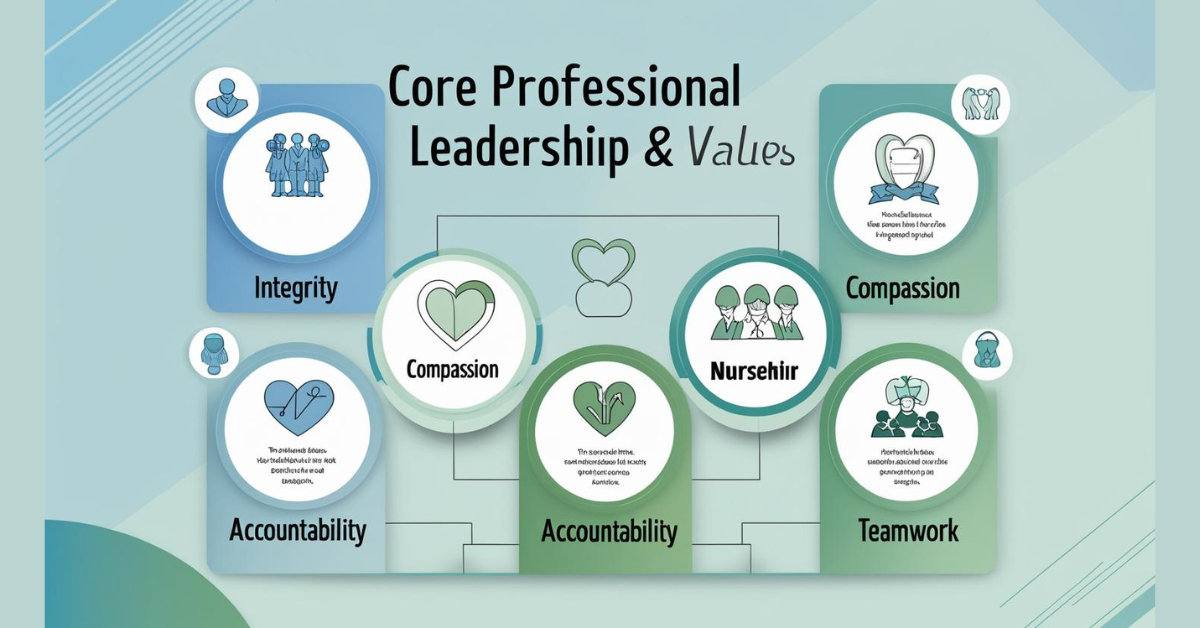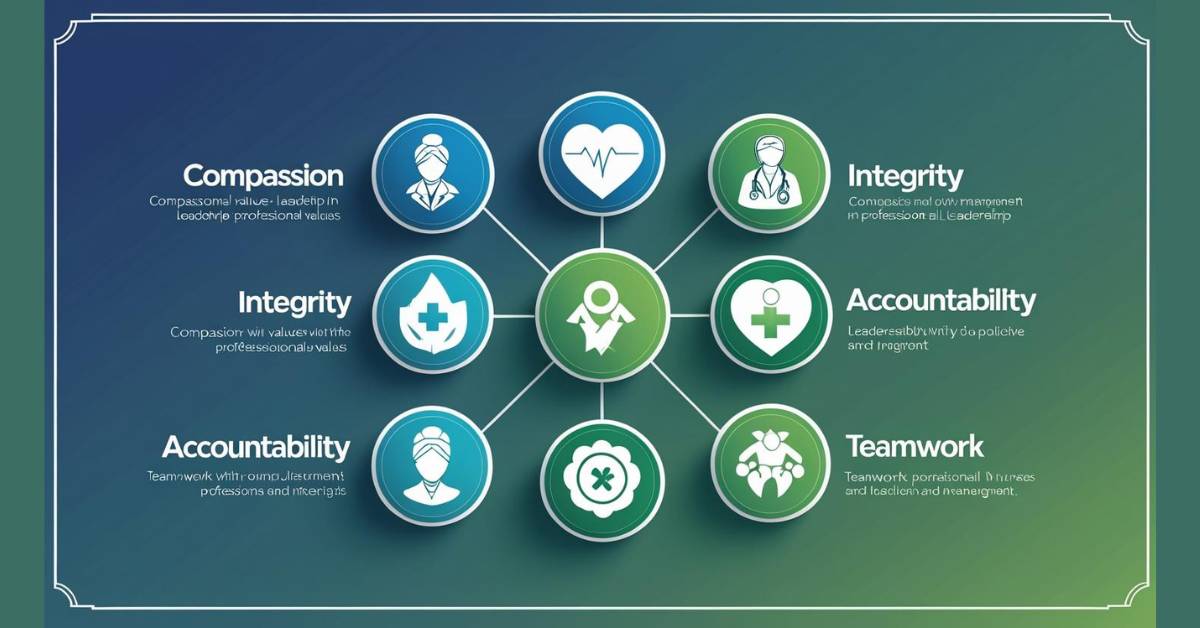The Core Professional Values for Nurses in Leadership and Management. Trust, integrity, honesty, and fairness are among the values mentioned. This theme shows the situations—particularly in terms of nurse leaders’ roles—that foster work engagement of nurses in hospitals, which is vital to the organization.
What are Core Professional Values for Nurses in Leadership and Management
The core professional values for nurses in leadership and management positions include compassion, integrity, responsibility, collaboration, and the pursuit of excellence. These values are essential for a positive work environment, patient well-being, and the achievement of organizational goals.
Compassion
Nurses in leadership positions must demonstrate genuine empathy and care for patients and staff, and create a supportive and understanding environment.
Integrity
Honesty, ethical behavior, and transparency in their interactions build trust and credibility within the team and with patients.
Accountability
Nurses in leadership positions are accountable for their actions and decisions and must be willing to take responsibility for results and learn from successes and mistakes.
Collaboration
Effective communication, teamwork, and shared decision-making are critical to successful nursing leadership and foster a sense of unity and common purpose.
Commitment to Excellence
A commitment to quality improvement, evidence-based practice, and continuing professional development is essential for optimal patient care and organizational effectiveness.
Other important values
These include autonomy, human dignity, social justice, and a commitment to diversity. Leaders must also demonstrate the courage to address ethical dilemmas and defend patients’ rights.
Values
Values are personal beliefs that influence behavior and give meaning and direction to life. Values evolve over time and reflect ethnic background, family life, cultural beliefs, environment, and societal norms. As people mature, their value systems may change and grow to encompass personal, professional, and societal values.
Although people are not always conscious of how much value systems influence decision making, people are constantly making decisions based on values. “Nurses have a right and duty to act according to their personal and professional values” (ANA, 2015a, p. 20). Being aware of personal values helps nurses to make clear, thoughtful, and consistent decisions. The process one goes through to understand personal values is called values clarification.
Values Clarification
Values clarification is the process of reflecting on and analyzing values to better understand what is important. Self-reflection on personal and professional values requires a readiness and willingness to take an honest look at personal behaviors, words, actions, motivations, and any congruencies or incongruences among them (Burkhardt & Nathaniel, 2008).
Values clarification leads to self-awareness. Through self-reflection, nurses can develop an insight into their value systems, thus enhancing their ability to make value decisions in nursing practice (Burkhardt & Nathaniel, 2008). Values clarification is an ongoing process of becoming self-ware of the personal and professional values that are important.
Nurses must become self-aware to be able to provide nonjudgmental care to patients and to develop and maintain a nonjudgmental approach to leadership and management. The nursing code of ethics, discussed later in this topic, obligates nurses to de liver care with respect for human needs and values without prejudice. It is difficult to carry out this obligation without self-awareness.
Core Professional Values for Nurses
Professionalism in nursing is defined as “the consistent demonstration of core values evidenced by nurses working with other professionals to achieve optimal health and wellness outcomes in patients, families, and communities by wisely applying principles of altruism, excellence, caring, ethics, respect, communication, and accountability” (AACN, 2008, p. 26).
Being a professional nurse involves accountability for oneself and one’s nursing practice and a duty to provide safe and quality care. Professional values and associated behaviors are critical to professional nursing practice (AACN, 2008; ANA, 2015a). There are five core professional values nurses must follow (AACN, 2008, pp. 27–28):
- Altruism: A concern for the welfare and well-being of others. In professional practice, altruism is reflected by a nurse’s concern and advocacy for the welfare of patients, other nurses, and other health-care providers.
- Autonomy: The right to self-determination. Professional practice reflects autonomy when the nurse respects a patient’s right to make health-care decisions.
- Human dignity: Respect for the inherent worth and uniqueness of individuals and populations. In professional practice, concern for human dignity is reflected when the nurse values and respects all patients and colleagues.
- Integrity: Acting in accordance with an appropriate code of ethics and accepted standards of practice. Integrity is reflected in professional practice when the nurse is honest and provides care based on an ethical framework that is accepted within the profession.
- Social justice: Acting in accordance with fair treatment regardless of economic status, race, ethnicity, age, citizenship, disability, or sexual orientation. Nurses must become self-aware and understand their personal values to better recognize situations that may result in inner conflict between personal and professional values.
Principles
Ethical principles are basic moral truths that guide a person’s actions. Valuing human dignity, respecting individuals, and believing in an individual’s right to be self-governing are the foundation of ethical principles. The principles of autonomy, beneficence, no maleficence, justice, fidelity, veracity, privacy, and confidentiality guide everyday nursing practice, regardless of roles or settings.
Autonomy
The principle of autonomy refers to self-governance, in that an individual is free to make choices about what can be done to his or her body. An individual makes autonomous decisions based on his or her own values, adequate and appropriate information, and freedom from coercion. An autonomous person has the capacity to understand reason, deliberate, manage, and independently choose a plan of care (Beauchamp & Childress, 2009).
Nurses respect autonomy by supporting a patient’s health-care choices, obtaining informed consent, allowing a patient to refuse treatments, and maintaining privacy and confidentiality. Nurse leaders and managers are responsible for promoting and protecting patient autonomy as well as professional autonomy among staff. Autonomy for nurses means “determining his/her own actions through in dependent choice, including demonstration of competence, within the full scope of nursing practice” (ANA, 2010, p. 39).
Beneficence
The principle of beneficence is a core principle of patient advocacy and refers to any action intended to benefit another—in other words, one’s actions should always promote good. Promoting good in nursing is exemplified several ways, such as encouraging a patient to undergo painful treatment if it will increase quality and quantity of life or honoring a patient’s wish to die (Guido, 2010). Some forms of beneficence are obligatory and include moral rules such as the following (Beauchamp & Childress, 2009, p. 199):
- Protect and defend the rights of others.
- Prevent harm from occurring to others.
- Remove conditions that will cause harm to others.
- Help persons with disabilities.
- Rescue persons in danger.
Nurse leaders and managers must frequently apply the principle of beneficence professionally when establishing staffing plans to ensure patient safety and avoid nurse fatigue, when conducting staff performance appraisals, and when assisting an employee in establishing a plan for professional growth.
Read More:
https://nurseseducator.com/didactic-and-dialectic-teaching-rationale-for-team-based-learning/
https://nurseseducator.com/high-fidelity-simulation-use-in-nursing-education/
First NCLEX Exam Center In Pakistan From Lahore (Mall of Lahore) to the Global Nursing
Categories of Journals: W, X, Y and Z Category Journal In Nursing Education
AI in Healthcare Content Creation: A Double-Edged Sword and Scary
Social Links:
https://www.facebook.com/nurseseducator/
https://www.instagram.com/nurseseducator/
https://www.pinterest.com/NursesEducator/
https://www.linkedin.com/in/nurseseducator/
https://www.researchgate.net/profile/Afza-Lal-Din
https://scholar.google.com/citations?hl=en&user=F0XY9vQAAAAJ


